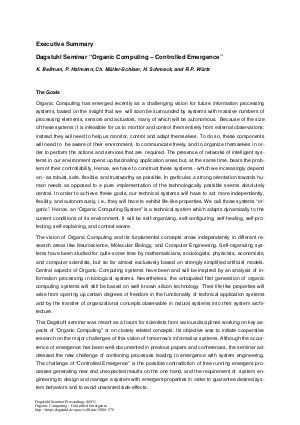06031 Executive Summary – Organic Computing – Controlled Emergence
Authors Kirstie Bellman, Peter Hofmann, Christian Müller-Schloer, Hartmut Schmeck, Rolf P. Würtz
-
Part of:
Volume:
Dagstuhl Seminar Proceedings, Volume 6031
Part of: Series: Dagstuhl Seminar Proceedings (DagSemProc) - License:
 Creative Commons Attribution 4.0 International license
Creative Commons Attribution 4.0 International license
- Publication Date: 2006-05-19
File

PDF
DagSemProc.06031.2.pdf
- Filesize: 0.51 MB
- 3 pages
Document Identifiers
Subject Classification
Keywords
- Emergence
- self-organization
- self-configuration
- self-healing
- self-protection
- self-explaining
- context-awareness
Metrics
- Access Statistics
-
Total Accesses (updated on a weekly basis)
0Document
0Metadata
Abstract
Organic Computing has emerged recently as a challenging vision for future information processing systems, based on the insight that we will soon be surrounded by systems with massive numbers of processing elements, sensors and actuators, many of which will be autonomous. Because of the size of these systems it is infeasible for us to monitor and control them entirely from external observations; instead they will need to help us monitor, control and adapt themselves. To do so, these components will need to be aware of their environment, to communicate freely, and to organize themselves in order to perform the actions and services that are required. The presence of networks of intelligent systems in our environment opens up fascinating application areas but, at the same time, bears the problem of their controllability. Hence, we have to construct these systems which we increasingly depend on as robust, safe, flexible, and trustworthy as possible. In particular, a strong orientation towards human needs as opposed to a pure implementation of the technologically possible seems absolutely central. In order to achieve these goals, our technical systems will have to act more independently, flexibly, and autonomously, i.e., they will have to exhibit lifelike properties. We call those systems ''organic''. Hence, an ''Organic Computing System'' is a technical system which adapts dynamically to the current conditions of its environment. It will be selforganizing, selfconfiguring, selfhealing, selfprotecting, selfexplaining, and context-aware.
Cite As Get BibTex
Kirstie Bellman, Peter Hofmann, Christian Müller-Schloer, Hartmut Schmeck, and Rolf P. Würtz. 06031 Executive Summary – Organic Computing – Controlled Emergence. In Organic Computing - Controlled Emergence. Dagstuhl Seminar Proceedings, Volume 6031, pp. 1-3, Schloss Dagstuhl – Leibniz-Zentrum für Informatik (2006)
https://doi.org/10.4230/DagSemProc.06031.2
BibTex
@InProceedings{bellman_et_al:DagSemProc.06031.2,
author = {Bellman, Kirstie and Hofmann, Peter and M\"{u}ller-Schloer, Christian and Schmeck, Hartmut and W\"{u}rtz, Rolf P.},
title = {{06031 Executive Summary – Organic Computing – Controlled Emergence}},
booktitle = {Organic Computing - Controlled Emergence},
pages = {1--3},
series = {Dagstuhl Seminar Proceedings (DagSemProc)},
ISSN = {1862-4405},
year = {2006},
volume = {6031},
editor = {Kirstie Bellman and Peter Hofmann and Christian M\"{u}ller-Schloer and Hartmut Schmeck and Rolf W\"{u}rtz},
publisher = {Schloss Dagstuhl -- Leibniz-Zentrum f{\"u}r Informatik},
address = {Dagstuhl, Germany},
URL = {https://drops.dagstuhl.de/entities/document/10.4230/DagSemProc.06031.2},
URN = {urn:nbn:de:0030-drops-5788},
doi = {10.4230/DagSemProc.06031.2},
annote = {Keywords: Emergence, self-organization, self-configuration, self-healing, self-protection, self-explaining, context-awareness}
}
